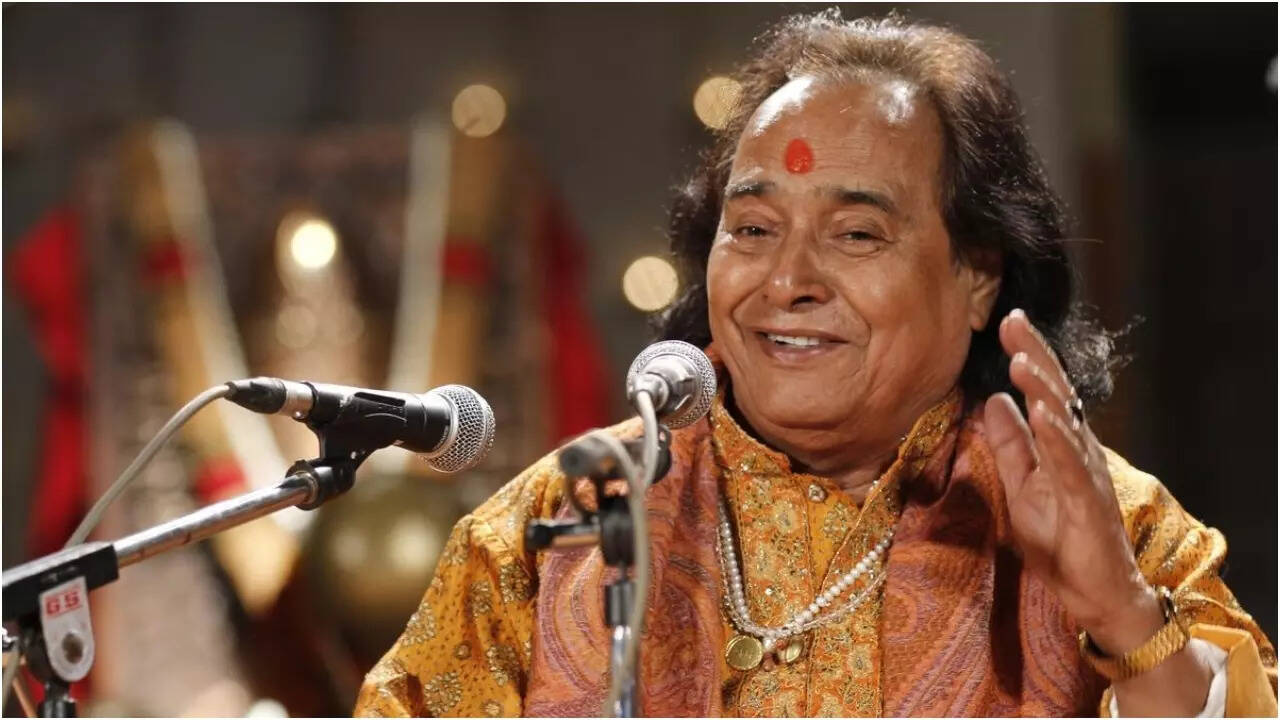India has lost one of its greatest voices in Hindustani classical music. Pandit Chhannulal Mishra, the celebrated classical vocalist, passed away on Thursday, October 2, 2025, in Mirzapur at the age of 89. He was more than just a singer—he was a cultural ambassador who carried the rich traditions of Indian music across generations and across the globe.

Early Life and Musical Journey
Pandit Chhannulal Mishra was born in 1936 in Varanasi, one of India’s most ancient and culturally vibrant cities. From a young age, he was immersed in the spiritual and artistic atmosphere of Varanasi, a city known for its music, art, and traditions. His father, Badri Prasad Mishra, introduced him to music, and young Chhannulal quickly showed immense talent.
He trained rigorously in Hindustani classical music, particularly in the Kirana and Banaras gharanas. His dedication to learning ragas, khayals, thumris, dadras, and bhajans shaped him into one of the most versatile and soulful singers of his time.
Contribution to Hindustani Classical Music
Pandit Mishra’s voice had a unique quality—it was powerful yet tender, spiritual yet accessible. While classical music can sometimes feel complex to the general audience, Pandit Mishra had the rare gift of making it easy to understand and enjoy.
He was especially famous for:
-
Khayals: His mastery over ragas and his deep emotional expression made his khayal performances unforgettable.
-
Thumri & Dadra: These semi-classical forms require both technical brilliance and emotional depth, and Pandit Mishra excelled at both.
-
Bhajans & Devotional Songs: His renditions of Kabir bhajans, Tulsidas bhajans, and other spiritual compositions touched millions of hearts.
Through his music, Pandit Mishra built a bridge between tradition and modernity. He made classical music appealing to younger generations without compromising its purity.
TotoGoodGame.com | iaqve.com | sjbbei.com
pokergw.com | matterlifecycle.com | buyfunmagic.com
Awards and Recognitions
Over the decades, Pandit Chhannulal Mishra received many prestigious awards for his contributions to music.
Some of his most notable recognitions include:
-
Padma Bhushan (2010) – One of India’s highest civilian awards, for his lifelong service to art and culture.
-
Padma Vibhushan (2019) – The second-highest civilian award in India, recognizing his unmatched contribution to Hindustani classical music.
-
Numerous state and national awards, along with global recognition, as he represented India in many international music festivals.
These awards were not just honors but acknowledgments of his tireless efforts to preserve and promote Indian classical traditions.
A Teacher and Guide
Apart from being a performer, Pandit Mishra was also a teacher and mentor to many young artists. He believed that the true legacy of music lies in passing it on. Many of his disciples today continue to sing and spread classical music, inspired by his guidance.
He often said, “Music is not just entertainment, it is meditation and devotion. It connects the singer to the divine and the listener to peace.”
Relationship with Prime Minister Narendra Modi
Pandit Mishra shared a close bond with Prime Minister Narendra Modi. In fact, he was one of the proposers for Modi’s nomination during the 2014 Varanasi Lok Sabha election.
On hearing the news of his passing, PM Modi expressed deep grief. He wrote, “I am deeply saddened by the passing of renowned classical singer Pandit Chhannulal Mishra. He dedicated his life to enriching Indian art and culture. I was fortunate to have always received his affection and blessings.”
This personal connection showed how Pandit Mishra was not just a musician but also a cultural figure who influenced leaders and citizens alike.
Tributes from Across the Nation
As the news of his death spread, tributes poured in from across India. Uttar Pradesh Chief Minister Yogi Adityanath expressed his condolences, calling him a “torchbearer of Indian classical music.” Musicians, students, and fans remembered him as someone who made music a part of everyday life.
Social media platforms were filled with people sharing his songs, especially his soulful bhajans, as a way of paying respect.
Final Journey and Last Rites
Pandit Mishra passed away at his daughter’s residence in Mirzapur after battling age-related health issues for more than two weeks. His last rites were scheduled to be performed in Varanasi, the city where his musical journey began and where countless admirers awaited to pay their final respects.
He is survived by his son, Ramkumar Mishra, a talented tabla player, and his three daughters. His family, students, and admirers continue to carry forward his musical legacy.
His Legacy in Indian Music
The death of Pandit Chhannulal Mishra marks the end of an era in Hindustani classical music. But his music will live on forever.
His legacy can be summed up in three powerful ways:
-
Preserving Tradition – He kept the roots of classical music strong by sticking to its original forms and ragas.
-
Popularizing Classical Music – He made classical music accessible to ordinary listeners by blending it with simplicity and devotion.
-
Inspiring Generations – His teaching and performances inspired young musicians to dedicate themselves to Indian art and culture.
For music lovers, his recordings will remain priceless treasures. Songs like his soulful bhajans and thumris will continue to echo in temples, concert halls, and homes for years to come.
Conclusion
Pandit Chhannulal Mishra was not just a singer—he was a guardian of India’s cultural heritage. His life was dedicated to music, devotion, and spreading joy. At 89, he leaves behind not just memories but a legacy that will guide Indian classical music for generations.
As Prime Minister Modi rightly said, his contributions went beyond entertainment—he enriched Indian culture and traditions on a global stage. His passing is a huge loss, but his music will forever remain immortal.
